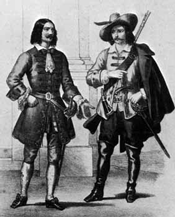
10 Jun 2009
VERDI: I masnadieri — Baden-Baden 1998
I masnadieri [The bandits]: Melodramma in four parts
Mozart and Salieri, an opera in one act consisting of two scenes.
Nicolai Rimsky-Korsakov (1844-1908), composer. Libretto derived from Alexander Puskhin's play of the same name.
First performance: 7 December 1898 in Moscow.
Ariadne auf Naxos, Oper with a prologue and one act. Music composed by Richard Strauss. Libretto by Hugo von Hofmannsthal.
La Vestale, a tragédie lyrique in three acts.
Boris Godunov, an opera in four acts with prologue
Modest Mussorgsky, composer. Libretto by the composer, based on Alexander Pushkin's drama Boris Godunov and Nikolai Karamazin's History of the Russian Empire
First performance: 8 February 1874 at the Mariinsky Theatre, St. Petersburg
Il Trovatore, dramma in four parts.
Only a few months following the premiere of Der Rosenkavalier, Hugo von Hofmannsthal proposed a new opera to Richard Strauss based on Molière’s comedy-ballet, Le Bourgeois gentilhomme (in German, Der Bürger als Edelmann).
Die Entführung aus dem Serail, Singspiel in 3 Acts.
Music composed by Wolfgang Amadeus Mozart (1756–1791). Libretto by Johann Gottlieb Stephanie the Younger, based on an earlier libretto by
Christoph Friedrich Bretzner.
Die Entführung aus dem Serail, Singspiel in 3 Acts.
Music composed by Wolfgang Amadeus Mozart (1756–1791). Libretto by Johann Gottlieb Stephanie the Younger, based on an earlier libretto by
Christoph Friedrich Bretzner.
Arabella: Lyrische Komödie in three acts
Die Entführung aus dem Serail, Singspiel in 3 Acts.
Music composed by Wolfgang Amadeus Mozart (1756–1791). Libretto by Johann Gottlieb Stephanie the Younger, based on an earlier libretto by
Christoph Friedrich Bretzner.
La Gioconda, dramma lirico in four acts.
Music composed by Amilcare Ponchielli (1834–1886). Libretto by Arrigo Boito (under the pseudonym Tobia Gorrio), based upon Victor Hugo's Angelo, Tyrant of Padua (1835).
Don Carlo, an opera in four acts. Music composed by Giuseppe Verdi (1813–1901). Libretto by Joseph Méry and Camille Du Locle after Friedrich von Schiller’s dramatic poem Don Carlos, Infant von Spanien. Revised version in four acts (French text revised by Du Locle, Italian translation by Achille de Lauzières and Angelo Zanardini).
Un ballo in maschera, a melodramma in three acts.
Music composed by Giuseppe Verdi. Libretto by Antonio Somma, based upon the work of Eugène Scribe Gustave III ou Le bal masqué (1833)
Medea: Melodramma tragico in three acts.
Die Tote Stadt, an opera in three acts.
Music composed by Erich Wolfgang Korngold (1897-1957). Libretto by Paul Schott (Julius and E. W. Korngold) after the novel Bruges la morte by Georges Rodenbach.
Some Details concerning the Revolution inaugurated by Rossini
Manon Lescaut, dramma lirico in quattro atti
Elektra: Tragedy in one act.
Lyric Opera of Chicago has announced both schedules and cast-lists for is Spring 2020 performances of Richard Wagner’s Ring Cycle. Given the series of individual productions already staged by the company since Fall 2016, that pave the way for the complete cycle, Lyric Opera of Chicago’s complete production should affirm the artistic might of the great composer.
“Diacono himself does not know what musical talent he possesses” – Mascagni

I masnadieri [The bandits]: Melodramma in four parts
Streaming Audio
Music composed by Giuseppe Verdi. Libretto by Andrea Maffei after Friedrich von Schiller’s play Die Räuber (1781).
| Principal Roles: | |
| Massimiliano, Count Moor | Bass |
| Carlo, his son | Tenor |
| Francesco, brother to Carlo | Baritone |
| Amalia, an orphan, the Count’s niece | Soprano |
| Arminio, the Count’s treasurer | Tenor |
| Moser, a pastor | Bass |
| Rolla, a companion of Carlo Moor | Tenor |
First Performance: 22 July 1847, Her Majesty’s Theatre, London
Scenes:
Part 1: A tavern on the border of Saxony, Franconia: a room in the Moors' castle, a bedroom in the castle
Part 2: An enclosure adjoining the castle chapel, the Bohemian forest
Part 3: A deserted place adjacent to the forest near the castle, inside the forest
Part 4: A suite of rooms, the forest as in the final scene of Part 3
Synopsis
The drama is set at the beginning of the 18th century and covers about three years. Carlo Moor, son of Count Massimiliano, is a young man of noble sentiments, although his impetuous temperament has caused him to lead a wild life. His younger brother, Francesco, deceitful and wicked, induces their father to disinherit Carlo, and sends him a mendacious letter telling him that he is forbidden to return home. Carlo swears to take revenge and becomes the leader of a band of robbers with whom he spreads terror in the forests of Bohemia. Meanwhile Francesco not only tries to win the love of Amalia, Carlo's betrothed, he also has his father told that Carlo is dead, and imprisons the old man in a tower to hasten his demise so that he will be able to usurp his title. Amalia, having escaped into the forest, suddenly finds herself face to face with Carlo, who has returned because of his nostalgia for her and for his ancestral home. The mysterious Arminio makes his way through the forest to take food secretly to the old Count. Carlo happens to witness this scene, frees his father and uncovers the plot. At this point he solemnly swears with his robbers to avenge the wrongs suffered by his father. In the concluding turmoil Carlo, overcome with hysterical fury, stabs his beloved in order not to involve her in the shame of his life as a bandit, and then heads for the gallows to pay for his crimes.